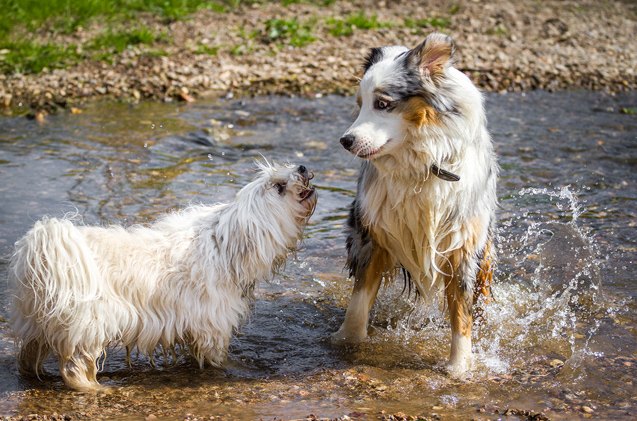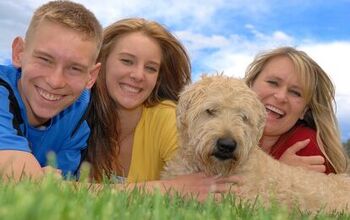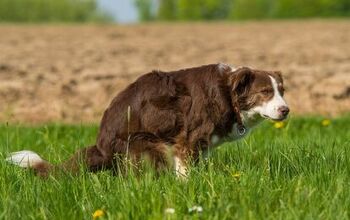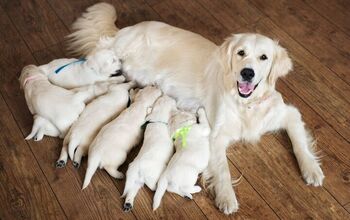All About Neutering Dogs

Neutering is something that every owner of a male dog should know about and consider. You may hear all kinds of stories about neutering (you probably know somebody whose best friend’s uncle twice-removed had their dog neutered and he was never the same again), but it’s best not to listen to hearsay and rumors when it comes to veterinary care. If you still have questions about neutering, your vet will be happy to answer them.
What is Neutering?
Neutering is the common term for sterilizing a male dog. That is, making it so he can’t sire puppies. It’s sometimes also known as castration. The procedure generally involves removing the testes entirely, although it’s not completely unheard of to perform a doggy vasectomy, where the tubing that carries the sperm from the testes to the penis is cut. If a vasectomy, rather than a full castration, is performed, all of the dog’s hormones (and any related behavioral problems related to testosterone) will still remain.
Related: Common Myths About Spaying And Neutering
When Should a Dog Be Neutered?
Veterinarians usually advise for a dog to be neutered between five and seven months of age. But new research shows that owners of larger dogs (Golden Retrievers, Labs, etc) should wait until the dog is at least 1 year old in order to prevent joint issues down the road.
The idea of neutering earlier is due to the fact that high levels of testosterone can cause unwanted behavioral problems, so a dog should be neutered before he reaches sexual maturity. Neutering earlier than this isn’t recommended, because younger dogs may be at more risk from going under general anesthetic. In addition, dogs neutered earlier than five months of age might have increased chances of developing hip dysplasia and cranial cruciate ligament rupture, particularly if they’re of a breed more predisposed to these conditions. However, if your dog is older than this, he can still be neutered.
Will a Dog Change When He’s Neutered?
Some people avoid neutering their dog because they think it will change their beloved pooch too much, but this is a fallacy. There may be some changes to your dog after he has been neutered, but there’s more to it than that. Neutering will only change any behaviors that your dog exhibits as a result of his hormones. These are the kinds of behaviors that are generally viewed as undesirable and include urine marking, aggression toward other male dogs, and humping or mounting other dogs, people, or inanimate objects. Having your dog neutered won’t change his personality, working abilities, or how friendly or playful he is.
Related: Why Spaying and Neutering Your Dog Is Necessary
Is Neutering a Serious Procedure?
Neutering is a less serious procedure than spaying (female sterilization), as the veterinary surgeon won’t need to cut into any of your dog’s body cavities to perform it. However, there’s always a risk when a dog goes under general anesthetic. Your dog should be able to come home on the same day as the surgery’s performed and will probably be back to his normal self the next day. However, he will have to take it easy (and wear the cone of shame) until his stitches are taken out.
What Are the Pros of Neutering?
Neutering your dog has a number of benefits. From a medical standpoint, if his testes have been removed, then it means he can’t get testicular cancer. It also reduces the chances of him contracting prostate cancer and having other prostate related problems. Neutering can help to reduce some common behavioral problems, such as aggression toward other dogs and roaming to find female dogs in heat. However, it’s important to note that neutering isn’t a quick fix for any and all behavior issues. Of course, there’s the obvious benefit of making sure that your dog can’t father any unwanted puppies.
Related: Spay And Neuter Options
What Are the Cons of Neutering?
Although it’s uncommon for there to be any problems, occasionally going under anesthetic can harm your dog. This is less common in younger, healthy dogs, but talk to your vet if you have any concerns. There’s a slightly increased risk of osteosarcoma and hemangiosarcoma in neutered dogs. Neutered dogs can be a little more prone to gaining weight, but as long as you feed your pooch a healthy diet and give him enough exercise this shouldn’t be a problem. As well, recent research as shown that if you neuter a large dog too soon, he may suffer from joint problems in the future.
Lauren Corona is a freelance writer from merry old England. She specializes in writing about dogs and other critters. Lauren lives near Oxford, with her gorgeous Doberman, Nola. When she’s not tapping away at the keyboard, you’ll find her walking in the woods with Nola-dog, raising money for the Oxfordshire Animal Sanctuary, cooking vegan food, making zines and writing about herself in the third person.

Lauren Corona is a freelance writer from merry old England. She specializes in writing about dogs and other critters. Lauren lives near Oxford, with her gorgeous Doberman, Nola. When she's not tapping away at the keyboard, you'll find her walking in the woods with Nola-dog, raising money for the Oxfordshire Animal Sanctuary, cooking vegan food, making zines and writing about herself in the third person.
More by Lauren Corona
























